Why the left hates Rishi Sunak’s rise to power
The new Tory PM destroys criticisms that the Conservatives are the bastion of male, pale and stale.
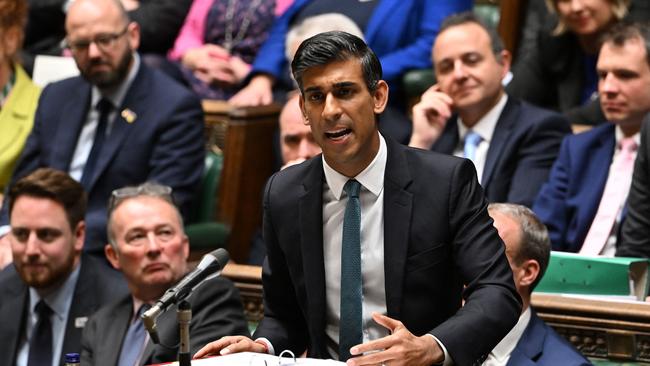
The new British Prime Minister is sleek, smart, smooth and, surprisingly perhaps, full of fire. He’s certainly going to give it a red-hot go.
His first Prime Minister’s Question Time was a characteristic and uniquely British mixture of the brutal and the banal, of genuine goodwill and lethal attack, delivered often by the same person at almost the same time.
The Labour leader, Sir Keir Starmer, who looked especially portly, middle-aged and pink compared with his lean and hungry opponent, nonetheless had some good lines.
Predictably, Starmer highlighted that Sunak only a couple of months ago lost a leadership vote among the Conservative Party rank and file to Liz Truss, whose disastrous seven-week prime ministership was the shortest in British history.
Starmer delivered his punch line to great effect: “The only time he (Sunak) ran in a competitive election he got trounced by the former prime minister (Liz Truss) who herself got beaten by a lettuce.”
Starmer was referring to a contest a British newspaper ran questioning whether Truss’s prime ministership would outlast a lettuce it photographed. It didn’t.
Sunak was having none of this. Don’t talk to me about mandates; you tried to overturn the biggest democratic vote in British history (the Brexit referendum). Don’t talk to me about national security; five minutes ago you supported Jeremy Corbyn (an extreme left-winger who tolerated gross anti-Semitism) for prime minister. Don’t talk to me about the concerns of ordinary people – you want open borders and unlimited immigration.
This was all preceded by Starmer and others genuinely congratulating Sunak for being the first British Prime Minister of Asian heritage. This was interspersed with backbenchers asking for extra funding for myriad local boondoggles.
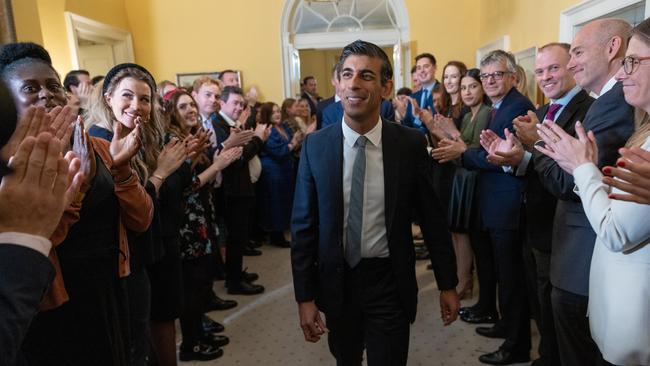
It was great stuff, a compelling circus of parliamentary democracy. Sunak was full of brio, and achieved great affect. He was fluent, fearless and sometimes fun. It recalled Boris Johnson in his pomp but was a bit more conventional. What could possibly go wrong?
It’s worth remarking the layers of irony and meaning wrapped up in Sunak’s ascension. He is a practising Hindu and took his oath of office as an MP holding the Bhagavad Gita. His parents are of Punjabi Indian origin via way of Africa. Dad was a doctor, mum a pharmacist.
The Indian diaspora, one of the great global dynamics of our time, is coming through Western politics – think Nicky Haley and Kamala Harris in the US – the way the Irish diaspora did 100 years ago.
Consider this, too. The two primary villains, the Ur-societies of racial exploitation and oppression in the anti-Western, postmodern, identity politics, omni-directional guilt-grinding worldview of our academic and chattering classes, are the US and Britain. Yet the US elected a man of African origin, Barack Obama, president, and Britain has chosen a man of Indian origin as prime minister.
Which other countries, among all those allegedly less racist, has chosen a member of a racial minority as its leader? Where is the blonde-haired ruler of an Arab society, the non-Han president of China?
In Britain, the Conservatives have it all over Labour in diversity. The Conservatives furnished Britain’s only Jewish prime minister in Benjamin Disraeli; its only female PMs in Margaret Thatcher, Theresa May and Liz Truss; its only Catholic (admittedly pretty nominal) prime minister in Boris Johnson, and now its only Asian and Hindu PM.
Here’s the great thing. Not one Conservative MP voted against Sunak because of his Indian origins, and none voted for him because of his Indian origins. Britain is not colour blind, but that is the way an equal citizenship which pays no heed to race – the antithesis of identity politics – should operate. It’s also, incidentally, why the progressive left is so uncomfortable with, and often viciously hostile to, conservatives from racial or religious minority backgrounds. They contradict the one grand narrative – racial identity politics – that the anti-grand narrative postmodernists actually believe in.
Sunak’s task is prodigious, herculean. Inflation is running at nearly 9 per cent. That means in a year you lose a month’s pay. Could you spare a month’s pay? Or if you’re on welfare, could you get by for a year on 11 months’ worth of payments?
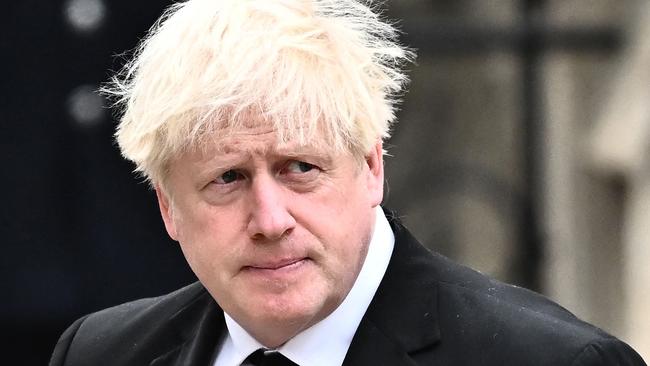
British government debt is about £2.3 trillion ($4.1 trillion), roughly the size of its gross domestic product. That is not the worst debt situation for a rich economy. But it’s a lot of debt and as interest rates rise, servicing it becomes ever more expensive. Most British debt is held by foreigners and that level of debt, combined with the recent instability in the government, makes the economy acutely vulnerable to market sentiment.
When Truss announced tax cuts with no matching spending cuts, and indeed also announced big spending increases, the bond markets started pricing in a crippling risk premium for British government debt. This led directly to Truss’s downfall.
Economic growth is flat. Energy prices are soaring. In the 2019 election manifesto, when Johnson won his famous victory, the Conservatives promised to ban fracking, a technique for extracting gas, or sometimes oil, from underground. This was typical of the excessive Green silliness of British politics at that moment. Truss wanted to overturn the fracking ban, but Sunak, aware of how tenuous his democratic credentials are, is sticking to the 2019 manifesto.
The fracking ban is symptomatic of the mess net-zero emissions policy has got Britain into. Britain, like most of Western Europe, needs gas as a back-up for renewables and indeed as a major source of base-load, reliable energy. Environmental sentiment is against developing domestic gas. So the solution – typical of the madness Green sentiment frequently leads to – was to rely on Russia for gas.
Covid exhausted the state’s coffers. Then came Russia’s war with Ukraine and the price of gas exploded. One of Truss’s biggest spending commitments was money to help British consumers pay their power bills. Sunak will continue with this for now, but wants to get rid of it.
Once the great reforms of the Thatcher era were thoroughly assimilated, Britain declined somewhat into a high-debt, low growth, low-productivity economy, similar to many economies in Western Europe. Johnson’s government spent hundreds and hundreds of billions of pounds bailing out the economy during Covid. As in Australia, the expenditure was excessive and poorly designed.
Now the Tories have reached a fiscal dead end. Truss’s idea was to liberate the animal spirits of the British economy, free up the supply side, through tax cuts. Sunak would like to do the same. But there’s no fiscal space, no more rope. Sunak echoes Thatcher in saying that you cannot cut taxes unless you cut expenditure and get the budget deficit and the national debt under control.
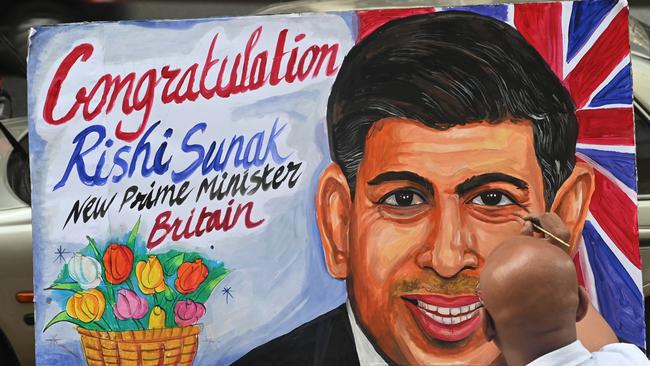
Yet somehow, in all this, through smart government and regulatory reform, Sunak must find a new growth strategy for the British economy, still the world’s sixth largest. British politics look stalemated in all directions. The same fiscal constraints will apply to a future Labor government. Sunak can’t do the Conservative thing of cutting taxes to promote growth, but Labor won’t be able to do the Labor thing of increasing the deficit and borrowing to fund new social programs.
Sunak has kept the urbane, emollient, eminently establishment and reassuring Jeremy Hunt as Chancellor. The departure of Truss and the arrival of Sunak with the retention of Hunt calmed the bond markets. Borrowing costs went down. The value of the pound rose. This allowed Sunak to postpone a fiscal statement until November 17. Hunt promises this statement will show government debt declining over the medium term. We’ll see in due course how credible that claim is.
It’s easy to forget that Britain was in a mess worse than this in the 1970s, with crippling strikes, three-day weeks, power outages. Thatcher restored order when she took over at the end of the 70s. She restored British pride. She not only freed up the supply side of the economy, she re-established the seriousness of British institutions. This also re-established the reputation for competence at all levels in the British bureaucracy. Thatcher was notoriously the hardest-working of modern prime ministers. She mastered the detail of the main government programs while still projecting a sense of strategic direction.
The past few years of Conservative government have not lived up to these high standards. Johnson is an astonishing political talent. But both he and his government were hit for six by Covid and his rule became shambolic and incoherent. His downfall was sparked by Sunak’s resignation as Chancellor. Sunak didn’t resign because he thought Johnson too ethically challenged to continue, but because he disagreed fundamentally with Johnson over budget policy.
That Sunak was in a position to do this at all arose from a bad Johnson mistake. Sunak was a junior minister in the Treasury portfolio under Sajid Javid, who was once seen as a leadership rival to Johnson. Partly under Dominic Cummings’ influence, Johnson insisted that the PM’s office choose all of Javid’s senior staff. Javid resigned in protest.
That’s seen off a leadership rival, Johnson perhaps thought, and appointed the hitherto unknown and very young Sunak as Chancellor. Sunak is still only 42, younger than Tony Blair or David Cameron when they became PM, and younger than any British prime Minister since the Napoleonic wars. In any event, “dishy Rishi”, as some labelled him, shone as Chancellor and ultimately became the second pole of a bipolar government. Now the Conservative Party is multipolar, not to say entropic, a whirling dervish of a political movement.
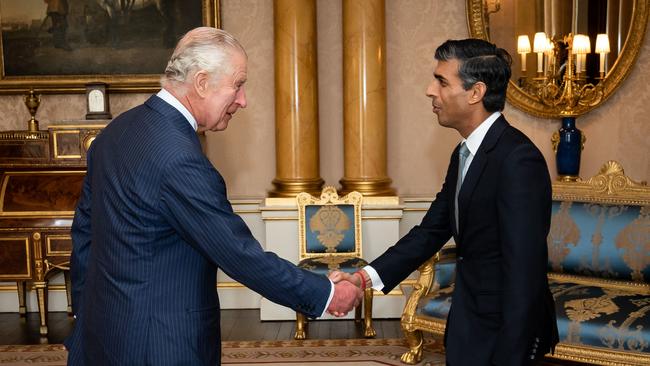
Can Sunak possibly unite the party, and the nation? A near-death experience, which the Conservatives have just endured, sometimes concentrates the mind. The composition of Sunak’s cabinet shows he wants a united party, or at least a party in which every major tendency has a stake in the government. He kept as Defence and Foreign Secretaries men who opposed Sunak’s leadership and instead backed Johnson’s return. This is not a cabinet just of cronies or, even worse, lackeys. Controversially, he reappointed the hardline Suella Braverman as Home Secretary. Braverman had been forced to resign under Truss for sending a government document on her private email. A silly mistake, but it doesn’t seem earth shattering.
There is both structural and personal disunity in the Conservatives. Like virtually all mainstream centre right parties in the West, the Conservatives now represent huge numbers of working class people. This is partly because patriotic working class Brits don’t like left-wing ideology. But it’s also because most progressive, left-wing causes end up benefiting the affluent progressives in the big cities and hurting the working class and the poor. Net zero is a classic example. It may be environmentally virtuous, but it results in huge power bills and these hit lower income and poor people much harder than they hit wealthy Londoners.
At the same time, the Conservatives have an at least notional attachment to lower taxes and smaller government. Working class voters don’t necessarily want smaller government. They just want government that works for them and not against them.
US Republicans and the Australian Liberal and National parties face exactly the same contradictions. But an intelligent conservative party ought to be able to speak to both sets of voters. Oddly enough, a good example of what conservatives need to do is provided by the Hawke government in the years after 1983. It drove the budget into balance and enacted numerous free-market reforms, while more effectively targeting welfare support to those who most needed it.
But across the West there is now enormous inefficiency in government and vast demands on social spending which seem overwhelming. The personal poisons inside the Conservative Party could be even worse for Sunak. Politics is a human business. Cameron resigned as prime minister after the people voted for Brexit and his people were alienated. May was removed by Johnson because she couldn’t bring Brexit off and her people were alienated. Johnson won a great victory but kept sacking ministers and falling out with advisers like Cummings. Then he was removed and he and his people were alienated. Do the Conservatives have the character to put that behind them?
Sunak’s other presentational weakness is he’s so rich. He made a fortune himself and then married an immensely wealthy Indian heiress. The couple are worth about $1.3bn.
The British public love all kinds of wealthy people, from Elton John to the Spice Girls. But Sunak had to tidy bits of his personal practice. He kept a US green card as Chancellor. He’s since given it up. And his wife, who claimed non-domiciled resident status so she didn’t have to pay tax on her foreign share earnings, has given that up.
But Sunak is plainly a self-made, well-motivated, decent man. The Conservatives historically do well with Indian voters, just as US Republicans have made huge inroads with Hispanics. Almost any traditional immigrant community is a bit more conservative than the inner-city woke zeitgeist in big Western societies. (Which makes you wonder why the Liberals and Nationals haven’t done better with ethnic voters in Australia.)
The odds are stacked against Sunak and his government. But after the giant personality of Thatcher was pushed out by a bitter and divided party, her mild mannered successor, John Major, in 1992 won an election against all expectations against Neil Kinnock. If Sunak does succeed against the odds, this will be good news not just for Britain, but for all Western politics.



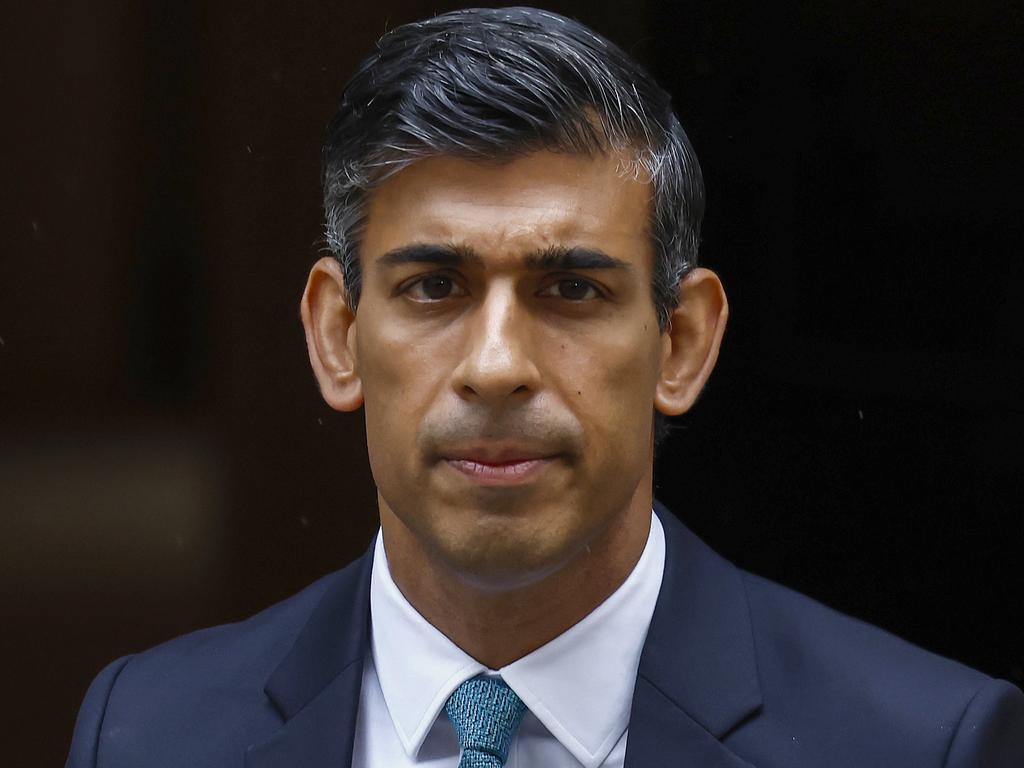
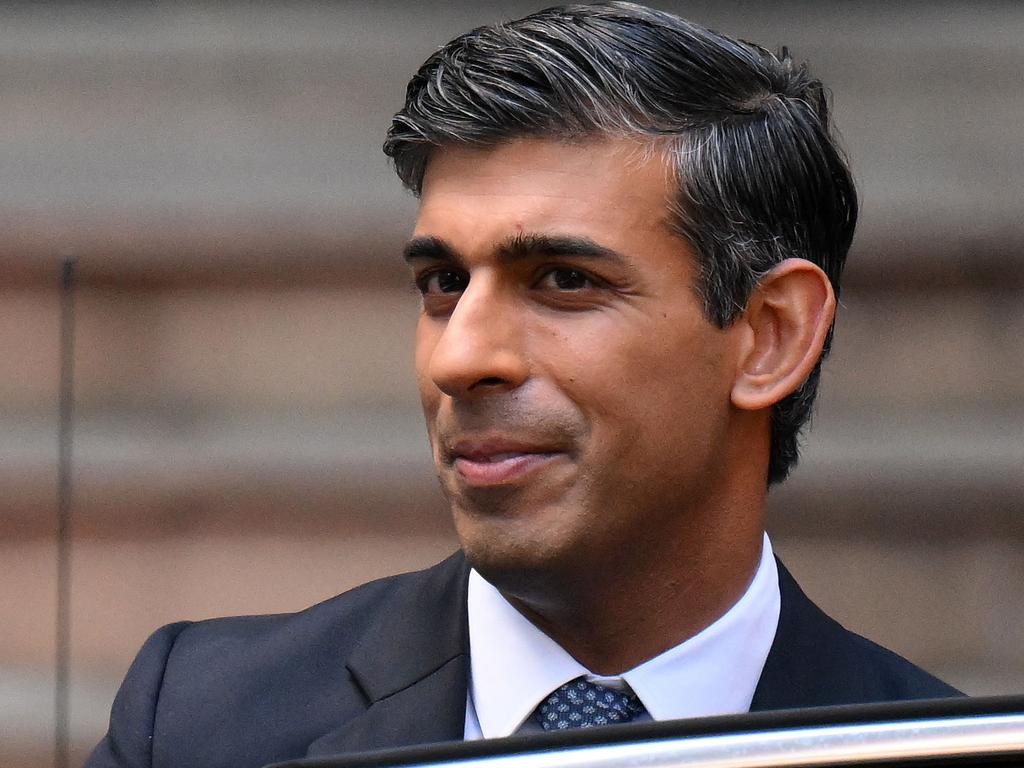



Can Rishi Sunak save the British Conservative Party? If he does pull off that miraculous feat, he might just save conservative politics more generally in the West.